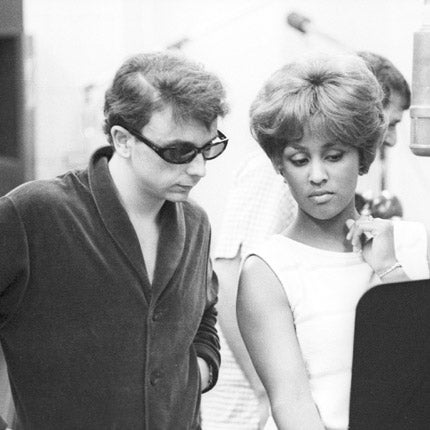Fame at last for rock'n'roll's unsung star
Darlene Love was the unacknowledged voice of many Sixties pop hits. Now that's all about to change

Your support helps us to tell the story
From reproductive rights to climate change to Big Tech, The Independent is on the ground when the story is developing. Whether it's investigating the financials of Elon Musk's pro-Trump PAC or producing our latest documentary, 'The A Word', which shines a light on the American women fighting for reproductive rights, we know how important it is to parse out the facts from the messaging.
At such a critical moment in US history, we need reporters on the ground. Your donation allows us to keep sending journalists to speak to both sides of the story.
The Independent is trusted by Americans across the entire political spectrum. And unlike many other quality news outlets, we choose not to lock Americans out of our reporting and analysis with paywalls. We believe quality journalism should be available to everyone, paid for by those who can afford it.
Your support makes all the difference.Today, the Rock and Roll Hall of Fame, the US museum that honours the most influential figures in the music industry, will welcome a clutch of new musicians into its fold with a glittering induction ceremony in New York.
Among this year's chosen ones are Alice Cooper, Neil Diamond, Dr John and Tom Waits, musicians whose names are already woven into the pop canon. There is a fifth singer on the list who is perhaps less familiar, despite having recorded a string of hit records and, in her heyday, performed with every pop icon in the book. She is Darlene Love and, even if you don't know her name, you will almost certainly have heard her voice.
Love began singing in her minister father's church in East LA. When she was 16, following a performance at a friend's wedding, the two bridesmaids asked her if they wanted to join their group. Thus, Darlene Love & the Blossoms were born, and swiftly made their name singing backing vocals for the likes of Sam Cooke and Bobby Darin.
In 1962, they were introduced to the producer Phil Spector, who asked Love to sing lead vocals on the Gene Pitney-penned "He's a Rebel". This was during the famous "Wall of Sound" era when Spector, a man known for his eccentric habits and short fuse, was at the height of his powers. So Love decided not to question his decision to attribute "He's a Rebel" to The Crystals, a New York group signed to his label, even though the voice on the record was hers. Love received a flat fee of $3,000 for her services. Meanwhile, the song went to No 1 and sold more than three million copies.
Spector assured Love that the next single she sang on, "He's Sure the Boy I Love", would have her name on it, though in the event The Crystals were credited again, and it was another big hit for its producer. Over the next few years, Love recorded scores of songs for Spector, only a handful of which were attributed to her, among them "Winter Wonderland" and "Christmas (Baby Please Come Home)".
In the late Sixties, Love tried to establish a solo career, though it was an uphill struggle since record buyers had no idea who she was. To make ends meet, she took backing vocalist jobs for Tom Jones, The Righteous Brothers, Aretha Franklin and Sonny & Cher. She appeared in Elvis Presley's '68 Comeback Special and went on the road with Dionne Warwick for nearly a decade. In 1981, she came back to Los Angeles so she could take care of her children, and found that the studio work had dried up. By now a single mother, she took a job as a Beverly Hills maid, cleaning the homes of the rich and well heeled.
Three years later, while cleaning someone else's bathroom, Love heard one of her songs on the radio. "I looked in the mirror and said, 'This is not what the Lord wants me to do'," she wrote in her 1998 autobiography. She went home and called Dionne Warwick, who agreed to loan her some money until she found her musical feet.
A series of roles in Broadway musicals enabled Love to return to singing, and led to acting parts in films including the Lethal Weapon series. Since then, Love has released assorted solo albums and compilations, toured up and down the US and even duetted with Bruce Springsteen. In 1993, she finally launched a lawsuit against Spector over unpaid royalties and, after several years of legal wrangling, won her case.
Now, 52 years after her career began, the music industry is at last honouring Love, an unsung hero who helped create the sound of the Sixties and was then cast aside by those whose coffers she so gracefully plumped. Today will doubtless be a glorious day for this "one-woman wall of sound", as Springsteen called her. It's just a shame it took so long.
Join our commenting forum
Join thought-provoking conversations, follow other Independent readers and see their replies
Comments